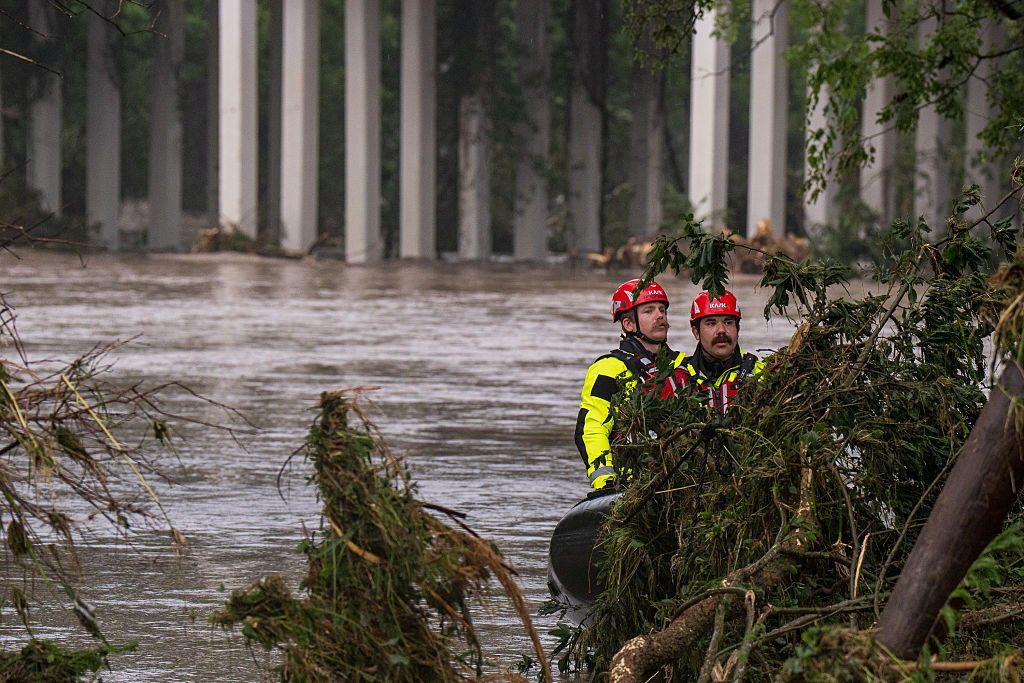Small-town Texans worry flood relief won't reach them
Dustin Huff is worried about Winnie, Texas.
"Everyone wants to get to Houston," he told CBS News. "Everybody forgets the little people in between."
Winnie is a small, unincorporated farm town in the southeast corner of Texas, not far from the Louisiana border. Hurricane Harvey significantly damaged at least 500 homes in the area — a staggering toll in a community of just 3,200 people.
"Most of the people we talked to had no flood insurance, as they did not live in the floodplain," Sarah Cerrone of the Chambers County Office of Emergency Management told CBS News.
Not only are thousands of people without safe homes, but many residents of Winnie are dependent on their land to make a living. Ranchers who lost their houses also lost thousands of dollars of future income when the floods wiped out their livestock and grain fields. One rancher, Steve Devillier, was unsure if any of his 250 cattle survived the storm. He estimated he'd lose about $800 per cow.
The damage in Houston, the country's hub of oil and gas industries, is undeniably devastating. The city and surrounding areas will also face years of work to get back to what they once were. But "[Winnie] is what feeds Houston," Huff said. "These cows, the rice, the soybeans."
Recovery efforts in Winnie are dependent on county officials and the locals who have stepped in to help their neighbors. "The state has given best they can, but the county has really been handling everything," Cerrone said.
And that's why Huff, a local business owner, is worried. He fired up an old boat to help rescue his neighbors, but it's what comes after the storm that is the hardest part. He remembers the many years it took for the town to recover after Hurricane Ike in 2008. "You didn't have nobody on the news," he said.
"Everybody's donating to the Red Cross and doing this and doing that. And that's all good, but you know, who's gonna get that money? Where's that gonna go," Huff wondered. "Nobody over here'll see it."
His fears aren't unfounded. According to Cerrone, they've had "very little support" from the Red Cross. FEMA's resources on the ground right now are mostly focused on helping get people registered for assistance. About 5,000 people have registered countywide so far.
Even with substantial support from government and volunteer organizations, cities often struggle for many years to get back to normal working order after a major natural disaster. But in smaller towns, where funds might be slower to trickle in, the impact of these massive storms can cause devastation that they may never fully recover from.
Take, for example, the small fishing community of Pearlington, Mississippi. Nestled in Hancock County's marshland on the Pearl River right along the Louisiana border, it was in the eye of the storm when Hurricane Katrina made landfall in August of 2005.
The town of just 1,700 people was almost entirely wiped out. In addition to the catastrophic winds, a massive 30-foot storm surge engulfed the community. Only two homes remained without significant damage.
It was 10 days before aid organizations made it to town, and six weeks before the Red Cross arrived to pass out meals. For a while, the only noticeable FEMA presence was a handful of portable bathrooms. Residents lived in tents for months next to their former homes while waiting for trailers from the federal government.
"The people of Pearlington continue to live like refugees in conditions not unlike those of the primitive tent city of Cité Soleil in Haiti, where sewage runs in the gutters," The New York Times reported in October 2005.
While most of the media coverage and relief money focused on New Orleans, the people of Pearlington were struggling to get resources.
"Six months after the storm hit, there's still no running water, no schools," a CBS Evening News report said in February 2006. Like Winnie, Pearlington is an unincorporated town, with no mayor or local government to lead rebuilding efforts, and no tax base to help fund those efforts.
At the time of the storm, about 17 percent of the Pearlington's residents lived below the poverty level. Flood insurance was a luxury most could not afford. So for years, recovery was almost entirely dependent on volunteers, and limited resources from the state of Mississippi as well as Hancock County.
Twelve years later, many houses have been repaired or rebuilt in Pearlington. FEMA reports $210 million went towards the reconstruction and relief efforts in Hancock County. But the town's population, which dropped by almost half after Katrina, is still about 25 percent less than what it once was. A quarter of the community now lives in poverty. Children go to school 15 miles away after the damaged one was torn down. Pearlington is often referred to as "Katrina's Forgotten Town."
Residents hope that's not what becomes of Winnie.








